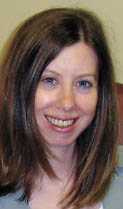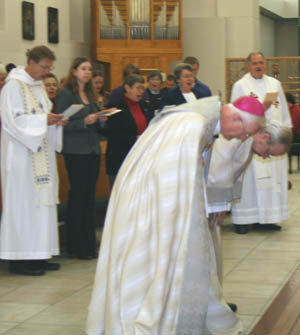(Editor’s note: This is the second of six talks that local religious leaders gave at St. Ambrose University in Davenport on Oct. 10, the vigil of the 50th anniversary of the opening of the Second Vatican Council. Rabbi Tamar Grimm leads the Tri-City Jewish Center in Rock Island, Ill.)
By Rabbi Tamar Grimm

I was 10 years old when I learned about Vatican II. My friend was over at my house and we were having a conversation when she said, “Your people killed Jesus.”
I had never heard that before, ever. I knew there were differences between Christians and Jews. I never thought there was any animosity. I went to my mom and said, ‘What’s this all about?” I distinctly remember my mom being outraged. She just kept saying “Vatican II, Vatican II. That doesn’t make any sense; she doesn’t know about Vatican II.”
I don’t think my mom was upset about my friend, but wondered where she was hearing this. My mom explained that the Church had made a statement that the Jewish people weren’t responsible for the death of Jesus. I grew up in the 1980s, 20 years after the council. I think we’ve come a long way since then.
Vatican II took away the blame, the animosity. It made way for dialogue. I’d like to say that 50 years after Vatican II all is well, but fear and hatred are hard to root out; as the Bible says, we are a stiff-necked people. I teach confirmation class. The kids have talked about the things they experience in school. I have heard that kids have been told that the Jews killed Jesus.

Religion isn’t politics, despite what the media would have us believe. If you look at what is being said by the political candidates, by the media, it looks as if there’s a huge division, a divisiveness between the religious right and left and the way they see their faith impacting their politics. That’s why it’s so important for the religious leaders to set an example.
We all learn from one another. We don’t have a monopoly on truth. I believe my tradition is true, but that doesn’t mean I can’t find truth within Catholicism or Lutheranism or other faith traditions.
Since I arrived in the Quad Cities two years ago, I’ve been involved in interfaith dialogue with local clergy, especially Father Mike Schaab (St. Pius Catholic Church, Rock Island, Ill.) and Imam Saad (Islamic Center of the Quad Cities, Moline, Ill.). The interfaith dialogue was going on before I got here, with my predecessor Rabbi Michael Samuel. There was discussion about whether this was something I wanted to continue, and I said I definitely wanted to continue it. We meet about once every month. The leaders are getting together and showing the laity, setting an example that we believe in the value of dialogue. Last year we held a forum — three sessions — one at Tri-City Jewish Center, one at the Islamic Center and one at St. Pius. At Vatican II, it was the leadership saying it’s OK to dialogue. People need to see that.
In dialoguing with one another, that’s how we get closer to G-d. (In Jewish tradition the name of God is not known, so a dash replaces the letter “o” out of respect for the holiness of God). G-d is G-d, but we all have our own paths to G-d. Human beings created religion. G-d didn’t create religion. Because G-d is infinite we do our best to describe G-d and put G-d into the box that is going to help us understand G-d. But that can never be complete. G-d is beyond any description. We try to box him in, but that’s us. The only way to unite with G-d is to unite ourselves, by being together.







